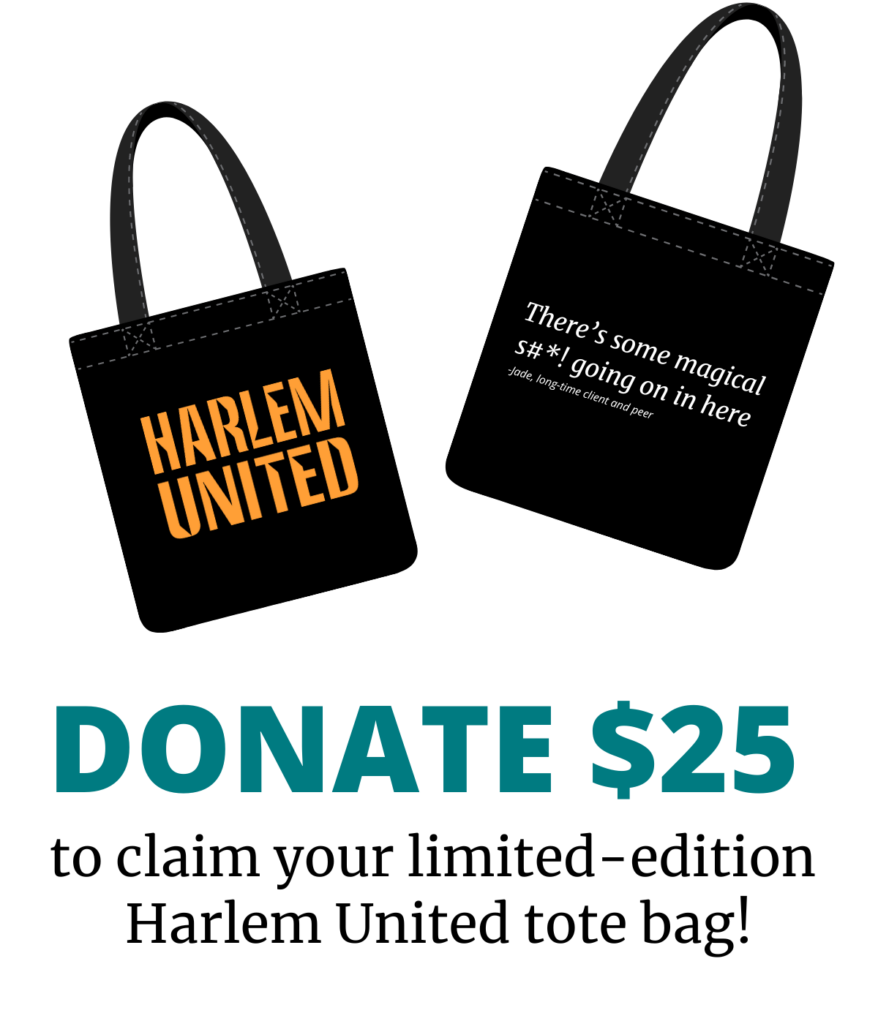THE UNITED VOICE
2023 Annual Report
Discrimination has destroyed the health of communities we love. Together, we can fix that.
Letter from the CEO
I love Harlem. It is a beautiful neighborhood with a rich history and a bright future. But decades of systemic racism have devastated the health of the neighborhood.
We can end health disparities and save lives, but not without real investment. Unfortunately, those in power do not prioritize people of color, individuals who use drugs, or the unhoused – the very people Harlem United serves.
I am so proud of the Harlem United community – the staff, clients, peers, and supporters, who stand up to indifference and discrimination. Together, we are interrupting cycles of health disparity, moving us closer to equality.

Jacqui Kilmer, CEO
2024 Highlights
CUTTING-EDGE RESEARCH
STOP STIGMA. SAVE LIVES.
BUILDING ON HIV INNOVATIONS
SAVING COMMUNITY HEALTHCARE
HEALTHCARE WHERE YOU NEED IT
75% AND GROWING
Compassion into Action: Launching a New Migrant Clinic
Harlem United was founded in response to crisis. We apply the lessons we learned at the peak of the HIV epidemic to every emerging issue that impacts our community – from COVID-19 to fentanyl.
This year, thousands of asylum seekers made their way to New York. The response from the city and state governments has been shameful.
In a clear ploy to discourage migrants from coming to New York, leaders have neglected our new neighbors’ basic needs. Our political leadership dropped the ball, so Harlem United picked it up.
We knew that thousands of resilient people were unconnected to healthcare and social services. So, we created a dedicated clinic to link asylum seekers living in the NYC shelter system to our health centers. They receive trauma-informed and culturally competent care, often in their first language, at no or low cost.
Our new neighbors escaped desperate situations and embarked on perilous journeys. Harlem United is here to welcome them with open arms.
Expanding the Promise of Harm Reduction
Harm Reduction is a mantra, an ideology, and a system of care. People who use drugs began the grassroots movement, creating compassionate strategies to improve their health without punishment. We were an early leader in the New York harm reduction community, opening one of the first syringe exchanges in the city.
This July, we launched a new street-based medicine project, and it couldn’t have come at a more necessary moment.
Last year saw the highest number of overdose deaths on record in NYC. The street-based medicine initiative provides a wide array of harm reduction tools to combat the overdose epidemic, but the real innovation? We’re able to prescribe and start clients on Buprenorphine on the street, meeting clients where they are.
The evidence shows that this medication-assisted treatment (MAT) helps decrease substance use more safely and sustainably. Initiating Buprenorphine on the spot decreases barriers like finding, scheduling, and keeping doctor’s appointments. Moreover, patients get free, affirming care, instead of a traditional healthcare institution where they may encounter stigma and high medical bills.
Ending Veteran’s Homelessness
Homelessness is a moral disaster that continues to plague New York City as inequality grows. So, it’s rare to hear a success story about NYC homelessness.
But since 2011, veteran street homelessness has decreased by 98%. A coordinated federal, state, and local effort, of which Harlem United is proud to be a part, has effectively eliminated chronic veterans’ homelessness. It took combined political will and a lot of funding, but it worked!
The end of veterans’ street homelessness in New York proves the obvious point: the solution to homelessness is housing!
We are proud to sustain this success by doubling the size of our veteran’s program this year. And we will continue speaking out against involuntary hospitalization, encampment sweeps, and cruelty—ineffective strategies that have been the prevailing approach to homelessness.
If our leaders want to end the homelessness crisis, we need massive investment in supportive and affordable housing. We know it will work, we just need the political will to make it happen.
Financials
July 1, 2021 to June 30, 2022
Annual Operating Budget: $50,481,653
Revenue
No Data Found
Expenses
No Data Found
